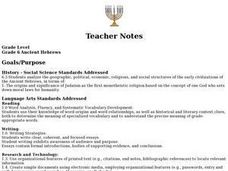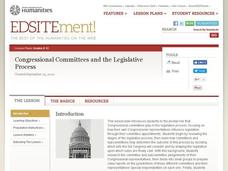Curated OER
Sea-ing More Clearly
Students explore historical importance of fish as food source, examine works of Robert Harris, create their own fish, and compose accompanying poetry. Students then explore dramatic tradition of Chorus inspired by Greek theatre,...
Curated OER
Stand Up and Sing: Music and Our Reform History
Students examine events of historical significance in music. In groups, they are given pieces of sheet music and work together to try to determine the social and political conditions of the time based on the lyrics. They write their own...
Curated OER
The Grapes of Wrath: Scrapbooks and Artifacts
Students interpret historical evidence presented in primary and secondary sources. In this Great Depression lesson plan, students read John Steinbeck's The Grapes of Wrath and use ethnographic research...
Curated OER
Virtual Realities of War
Learners outline the major events, mat??riel, and setting of a war or conflict. They develop a computer game narrative that draws on these historically accurate details.
Curated OER
The Cultural Geography of Egypt
Middle schoolers describe Egypt's historical, cultural and recreational sites and activities. They explain Egyptian customs and conduct; and apply what they have learned to create a travel brochure about Egypt.
Curated OER
George Washington's Revolutionary Journeys
Students take a closer look at historical maps. In this American Revolution lesson, students examine the provided historical maps and documents to determine the assignments that George Washington assigned to subordinates during the...
Curated OER
Ancient Hebrews
Sixth graders analyze the geographic, political, economic, religious, and social structures of the early civilizations of the Ancient Hebrews, and write an essay.
Curated OER
Music Around the State: Sound and Place
Learners identify and interpret the styles and elements of music in three major folk regions of Louisiana within specific traditional music genres. Then they hear the diversity of music in the state and identify the major genres of...
Curated OER
HARLEM RENAISSANCE
Students analyze historical conditions which led African Americans to settle in Harlem. They describe the culture of everyday life in Harlem and identify individuals significant to the Harlem Renaissance and describe their contributions...
National First Ladies' Library
Blunders on All Sides: The Battle of Bunker Hill
High schoolers investigate the concepts surrounding the historical battle of Bunker Hill while conducting online research using a variety of resources. The information is used in order to create a newspaper article telling about the...
Curated OER
The Emancipation Proclamation
Students explore the historical importance of the Emancipation Proclamation. In this United States History lesson, students use the internet to research the specific events that were centered around the Emancipation Proclamation, then...
Curated OER
Meet the Press: American Presidents
High schoolers interpret historical evidence presented in primary and secondary resources. In this presidential history lesson plan, students research the accomplishments of George Washington, Abraham Lincoln, Frankiln D. Roosevelt, and...
Curated OER
Cartoons for the Classroom: Teaming up on Health Care?
In this historical events worksheet, students analyze a political cartoon about health care and respond to 3 talking point questions
Curated OER
Cartoons for the Classroom: A Parody of Broken Promises
Parodies of political figures are the lifeblood of the editorial cartoons in a free press. North Korea's nuclear threat provides young political scientists an opportunity to hone their critical thinking skills as they analyze a cartoon...
Curated OER
Historical Fashions - Interdisciplinary Experience, Art & Social Studies
Seventh graders research styles, construction, fabrics, colors, and cost of Colonial era clothing. They create a life-sized model of themselves wearing Colonial period clothing and write a report about the clothes they designed.
Curated OER
1968: Year of Social Change and Turning Point in Vietnam and the United States
Eleventh graders examine the year 1968 in Vietnam and the United States. They work together to research events which they create a timeline. They also read primary source documents of veterans of the Vietnam War.
Curated OER
Washington Irving in Context
Students examine the various roles Washington Irving had in his lifetime. Examining the situation in Europe and the United States, they are encouraged to relate Irving's experiences to different events. They examine themselves in many...
Curated OER
Grand Canyon Suite
Take a trip to the Grand Canyon! Lesson one explores how Ferde Grofe painted a musical landscape of America when he wrote the Grand Canyon Suite. Learners then examine art that shows the Grand Canyon in lesson two. Finally, lesson three...
Curated OER
Investigating the Harlem Renaissance
The work of Langston Hughes opens the door to research into the origin and legacy of the Harlem Renaissance and how the literature of the period can be viewed as a commentary on race relations in America. In addition, groups are assigned...
Curated OER
Congressional Committees and the Legislative Process
Students consider the importance and influence of congressional committees. They research congressional committee assignments, jurisdictions and responsibilities as illustrations of the basic principles of American federalism.
Curated OER
Seeing Is Believing
Students research and describe the stories of Thomas Jefferson, Meriwether Lewis and William Clark. They analyze historical sources from different points of view and present an analysis of two historical contexts.
Curated OER
Jazz in America
Young scholars participate in a class discussion about jazz music, compare improvisation with regular conversion, listen to various jazz musicians and compare and contrast their individual sounds.
Curated OER
Tools of the Historian: Frame of Reference
Students discuss the term point of reference and describe their own point of view. They compare the relationship between sources and the historical context. They identify examples of how point of reference can affect one's interpretation.

























